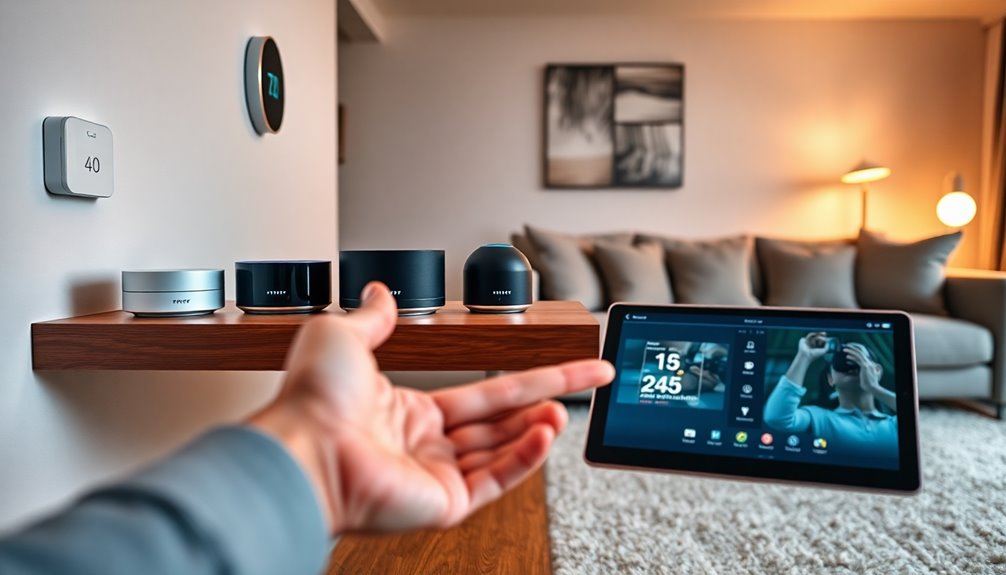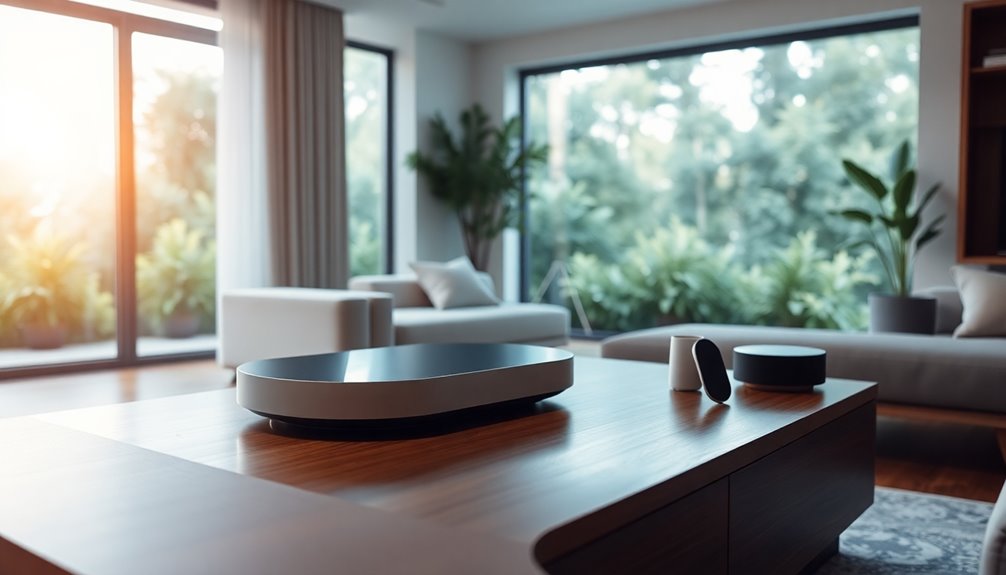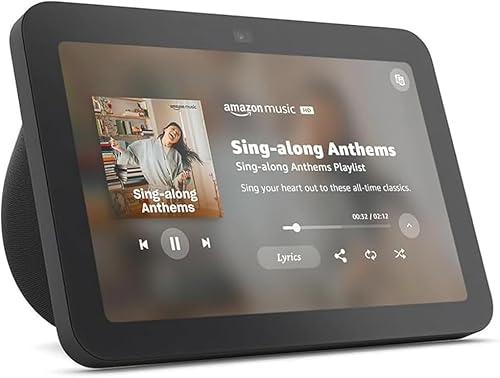If you're looking for the best smart home hubs of 2025, I've got you covered. These hubs connect multiple devices, making automation smoother and more efficient. I love how they support various protocols like Zigbee, Z-Wave, and Wi-Fi, ensuring compatibility with different smart devices. Some models even allow local processing, which means they keep working reliably even during internet outages. Voice command features with Alexa and Google Assistant make them super convenient. Check out my list of top picks that cater to both casual users and tech enthusiasts alike. You'll discover all the top contenders in smart home automation!
Key Takeaways
- Look for smart home hubs with multi-protocol support (Zigbee, Z-Wave, Wi-Fi) for extensive device compatibility and integration.
- Choose hubs with local processing capabilities to ensure reliable performance during internet outages and enhance privacy.
- Consider user-friendly interfaces and mobile applications that cater to both beginners and advanced users for easy device management.
- Check for compatibility with major voice assistants like Amazon Alexa, Google Assistant, and Apple HomeKit for seamless voice control.
- Prioritize hubs with robust privacy and security features, including end-to-end encryption and local data processing, to protect personal information.
Aeotec Smart Home Hub (Compatible with Alexa and Google Assistant)
If you're looking for a smart home hub that seamlessly integrates with both Alexa and Google Assistant, the Aeotec Smart Home Hub is a top choice for you. This compact hub connects over 5,000 smart devices, giving you the flexibility to control everything from lights to sensors effortlessly. I found the setup process straightforward; just download the SmartThings app and follow the prompts. It's even capable of local automation, so your routines keep running even if the internet goes down. While I appreciated the vast compatibility, some users mentioned challenges with Z-Wave devices, particularly locks. Nevertheless, with a solid customer rating of 4.2 stars, it's clear many find Aeotec a reliable option for home automation.
Best For: Individuals looking for a versatile smart home hub that integrates effortlessly with both Alexa and Google Assistant for seamless home automation.
Pros:
- Supports over 5,000 smart devices, providing extensive compatibility across various brands.
- Allows for local automation, ensuring routines continue to function even during internet outages.
- Easy setup process via the SmartThings app, with a generally positive user experience reported.
Cons:
- Some users have experienced difficulties pairing specific Z-Wave devices, particularly smart locks.
- A need for clearer instructions regarding device pairing has been noted by several users.
- Initial setup requires internet access, which may be a limitation for those without stable connectivity.
Amazon Echo Hub Smart Home Control Panel with Alexa
The Amazon Echo Hub stands out as an exceptional choice for individuals who thrive on seamless smart home management. With its 8" touch screen and compatibility with thousands of Alexa-compatible devices, it makes controlling your home effortless. I love how I can arm and disarm my security system, check cameras, and adjust thermostats all from one central panel. The integration of Amazon Sidewalk enhances connectivity, even when WiFi falters. While it's not designed for extensive audio playback or video watching, it fits perfectly in my smart home setup. Plus, I appreciate the privacy features, including a microphone off button. Overall, the Echo Hub delivers a modern aesthetic and functionality for anyone invested in home automation.
Best For: Individuals seeking a seamless smart home management solution with a focus on security and connectivity.
Pros:
- Seamless integration with thousands of Alexa-compatible devices for easy home automation.
- Advanced privacy features, including a microphone off button and end-to-end encryption for video.
- Modern design with an 8" touch screen enhances the aesthetics of any smart home setup.
Cons:
- Not optimized for extensive audio playback or video watching, limiting its entertainment capabilities.
- May experience performance issues, such as lag and limited app functionality, similar to a low-end tablet.
- Priced higher than some alternatives, which might not appeal to all budget-conscious consumers.
Amazon Echo Show 8 with Alexa and Smart Home Hub
Looking for a smart home hub that seamlessly integrates with your existing devices? The Amazon Echo Show 8 is an impressive choice. With its 8.0" HD touchscreen and a powerful 13 MP camera, it offers both functionality and entertainment. I love how it controls Zigbee, Matter, and Thread devices without needing another hub. Just use your voice to manage everything from lights to cameras, making smart home automation a breeze.
The audio quality is exceptional, thanks to the spatial audio, and I can easily stream my favorite shows on platforms like Prime Video and Netflix. Plus, privacy features like the camera shutter and mic mute give me peace of mind. Overall, the Echo Show 8 enhances my daily routines effortlessly!
Best For: Individuals seeking an all-in-one smart home hub that integrates seamlessly with multiple devices and offers entertainment features.
Pros:
- Smart Home Hub: Controls Zigbee, Matter, and Thread devices without needing a separate hub, simplifying home automation.
- High-Quality Audio and Video: Features spatial audio and an 8.0" HD touchscreen for an immersive streaming experience.
- Privacy Features: Includes a camera shutter and microphone mute for enhanced privacy and security.
Cons:
- Camera Performance: Some users report subpar camera performance in low light conditions.
- Display Delays: Occasional delays in display responsiveness have been noted by certain users.
- Subscription Requirements: Accessing certain music streaming services may require additional subscriptions.
Home Assistant Green Smart Home Hub
For tech enthusiasts enthusiastic to create a tailored smart home experience, the Home Assistant Green Smart Home Hub stands out with its advanced automation capabilities. Weighing just 12 ounces and measuring 4.41 inches square, it's compact yet powerful, featuring a quad-core processor, 4GB RAM, and 32GB storage. The setup is straightforward—just plug it in and connect to your Ethernet for peak performance. This hub simplifies managing your entire ecosystem, supporting over 50 devices while ensuring your data remains local. Although some find the learning curve a bit steep, the extensive community support makes it easier. If you're willing to invest time in mastering it, Home Assistant Green offers robust flexibility and performance, making it a top choice for smart home automation.
Best For: Tech enthusiasts and users with some technical knowledge looking for a customizable and robust smart home hub.
Pros:
- Central control of your smart home ecosystem reduces app clutter and simplifies management.
- Advanced automation capabilities allow for personalized routines and tailored smart home experiences.
- Local data privacy ensures user data remains secure and easily accessible.
Cons:
- Some users may encounter a steep learning curve if they lack prior coding experience.
- Initial setup and integration can be challenging with certain devices, like Google Nest.
- Requires a commitment of time to fully explore and master its extensive features.
Amazon Echo (Newest Model) with Alexa and Smart Home Hub
With its built-in smart home hub capabilities, the Amazon Echo (newest model) is perfect for anyone wanting to seamlessly integrate their smart devices into a single, user-friendly system. This 4th Gen Echo boasts premium sound quality, thanks to its 3.0" woofer and dual tweeters, making it ideal for music lovers. I appreciate how Alexa effortlessly controls compatible lights, locks, and sensors through Zigbee, Matter, and Thread. The device also features eero built-in for enhanced Wi-Fi coverage, ensuring my devices stay connected. Setting up routines is a breeze; I can automate tasks like brewing coffee or adjusting lights. Plus, privacy controls offer peace of mind. Overall, I've found the Echo to be a reliable hub that elevates my smart home experience.
Best For: Individuals looking to enhance their smart home experience with a versatile, high-quality speaker and integrated device control.
Pros:
- Premium Sound Quality: Features a 3.0" woofer and dual tweeters for rich, detailed audio.
- Smart Home Integration: Built-in hub supports a variety of compatible devices using Zigbee, Matter, and Thread.
- User-Friendly Setup: Easy to connect and automate tasks through Alexa, making it accessible for all users.
Cons:
- Connectivity Issues: Some users may experience interruptions in music playback, potentially due to internet connectivity problems.
- Size and Weight: The device may take up more space compared to smaller smart speakers.
- Limited Compatibility: While it supports many devices, not all smart home products are compatible with the built-in hub.
Homey Pro Smart Home Hub for Home Automation
The Homey Pro Smart Home Hub stands out as an ideal choice for tech-savvy homeowners who want extensive control over their smart devices. With compatibility for over 50,000 devices from more than 1,000 brands like Philips Hue and Sonos, it truly excels in versatility. I love how it supports multiple protocols, including Z-Wave, Zigbee, and Wi-Fi, allowing seamless integration. The Homey Flow feature enables me to create personalized automations, making my home smarter and more efficient. While I've encountered some challenges with device compatibility, especially for North American devices, the local processing capability offers peace of mind. Overall, despite mixed reviews on customer support, the Homey Pro remains a powerful option for anyone serious about home automation.
Best For: Tech-savvy homeowners seeking extensive control and automation capabilities for their smart home devices.
Pros:
- Supports over 50,000 devices from 1,000+ brands, ensuring vast compatibility.
- Local processing enhances privacy and reliability by minimizing cloud dependency.
- Homey Flow feature allows for easy creation of personalized automations.
Cons:
- Some users report challenges with device compatibility, particularly for North American devices.
- Customer service has received mixed reviews, with reports of unresponsive support.
- Limited official apps and support for certain popular devices like Tuya and SONOFF.
Lutron Caseta Smart Lighting Hub (L-BDG2-WH)
If you're looking to elevate your smart home experience, the Lutron Caseta Smart Lighting Hub (L-BDG2-WH) stands out as an ideal choice for anyone wanting seamless control over their lighting and shades. This hub manages up to 75 devices, offering extensive customization options. I love that it integrates effortlessly with Alexa, Apple HomeKit, and Google Assistant, allowing me to control lights and shades via my smartphone, tablet, or even my Apple Watch. The geo-fencing feature is a game changer, automatically adjusting lights based on my location. Setup is straightforward—just plug it in and connect it to your Wi-Fi. Although some users faced initial hiccups during installation, the overall responsiveness and reliability of the Lutron ecosystem have impressed me immensely.
Best For: Those seeking an easy-to-use smart home lighting solution that integrates with multiple platforms and supports extensive customization.
Pros:
- Seamless integration with major smart home platforms like Alexa, Apple HomeKit, and Google Assistant.
- Geo-fencing feature automatically adjusts lighting based on your location for enhanced convenience.
- Supports up to 75 devices, allowing for significant expansion and personalization of your smart home system.
Cons:
- Some users report initial installation challenges, particularly with firmware updates.
- Setup may require additional hardware, like connecting through a switch if router ports are unavailable.
- Suggestions for clearer installation instructions and improved app functionality have been noted by users.
Amazon Echo Show 15 Smart Kitchen TV with Alexa
For busy families looking to streamline their daily routines, the Amazon Echo Show 15 Smart Kitchen TV with Alexa stands out as an ideal choice. With its 15.6-inch Full-HD display, it offers customizable widgets for calendars, to-do lists, and weather updates, making organization a breeze. I love that it includes built-in Fire TV, giving us access to popular streaming apps like Netflix and Prime Video. The 13 MP camera with auto-framing makes video calls feel personal, and the vibrant audio system enhances our entertainment experience. Plus, it acts as a smart home hub, supporting Zigbee and Matter protocols. With robust privacy controls, I feel secure while enjoying all the features this innovative device provides.
Best For: Busy families looking to streamline their daily routines and enhance their smart home experience.
Pros:
- Customizable widgets for easy access to family calendars and to-do lists.
- High-quality audio and video performance for streaming and video calls.
- Robust privacy controls including a mic/camera-off button and camera shutter.
Cons:
- Requires WiFi for operation, limiting use in areas with poor connectivity.
- The display size may be too large for smaller kitchen spaces.
- Initial setup may require compatibility checks with existing devices and networks.
SmartThings Hub 3rd Generation Smart Home Automation Hub
Looking for a versatile smart home solution? The SmartThings Hub 3rd Generation is an excellent choice. It supports Zigbee, Z-Wave, and Cloud-to-Cloud protocols, making it compatible with a wide range of devices. With voice control through Alexa and Google Assistant, I can easily automate my home. Setting it up takes just minutes—plug in the hub, download the SmartThings app, and scan the QR code to pair devices. I appreciate its compact design and the option for Ethernet connectivity, which enhances reliability. However, some users have reported integration issues with certain Wi-Fi devices. Overall, with its solid automation capabilities and ease of use, the SmartThings Hub is definitely worth considering for your smart home needs.
Best For: Smart home enthusiasts looking for a versatile and user-friendly hub to integrate and automate various smart devices.
Pros:
- Supports multiple protocols (Zigbee, Z-Wave, Cloud-to-Cloud) for wide device compatibility.
- Quick and easy setup process, taking under 15 minutes to pair devices.
- Voice control capabilities with Alexa and Google Assistant for hands-free automation.
Cons:
- Integration issues reported with certain Wi-Fi devices, limiting compatibility.
- Mixed reviews regarding product reliability and performance with existing smart devices.
- Limited troubleshooting instructions, which can lead to challenges during setup.
GHome Smart Mini Plug Compatible with Alexa and Google Home (4 Pack)
The GHome Smart Mini Plug (4 Pack) stands out as a top choice for anyone enthusiastic to plunge into the world of smart home automation without the hassle of complicated setups. These compact plugs are compatible with both Alexa and Google Home, making voice control a breeze. I found the setup incredibly easy—just connect to a stable 2.4GHz network, and you're good to go. With the accompanying app, I can control devices remotely, set schedules, and even use auto-off timers. Group management is seamless, allowing me to control multiple plugs with a single command. Overall, I've enjoyed consistent performance and reliability, making these plugs a fantastic addition to any smart home.
Best For: Individuals looking to easily incorporate smart home technology into their lives without complicated setups.
Pros:
- Easy Setup: Quick installation with minimal technical knowledge required.
- Remote Control: Control devices from anywhere via a user-friendly app.
- Voice Control Compatibility: Works seamlessly with Alexa and Google Home for hands-free operation.
Cons:
- Occasional Connectivity Issues: Some users have reported sporadic connection problems.
- Limited to 2.4GHz Networks: Only compatible with 2.4GHz Wi-Fi, which may not suit all home setups.
- Dependence on App: Requires reliance on the app for full functionality, which may not appeal to everyone.
Matter Smart Home Hub, Thread & Tuya Zigbee 3.0
With its robust multi-protocol support, the Matter Smart Home Hub (M1) stands out as an ideal choice for tech-savvy homeowners enthusiastic to streamline their smart devices. It seamlessly integrates Tuya Zigbee 3.0 and Thread devices, although I recommend sticking with Zemismart verified products for the best compatibility. I appreciate how it allows me to control Tuya devices through platforms like Google Home and Apple HomeKit, all while supporting voice commands via Siri or Google Assistant. However, I've noticed some users struggle with non-Tuya Zigbee devices, requiring extra hardware for full functionality. Overall, while setup can be tricky and might need firmware updates, the hub's versatility and integration capabilities make it a compelling option for home automation.
Best For: Tech-savvy homeowners who want to streamline their smart devices with versatile integration options.
Pros:
- Multi-protocol support enables seamless integration with both Tuya Zigbee 3.0 and Thread devices.
- Allows for control across multiple platforms, including Google Home and Apple HomeKit, enhancing user convenience.
- Voice command functionality through Siri and Google Assistant adds ease of use and hands-free control.
Cons:
- Compatibility issues with non-Tuya Zigbee devices may require additional hardware for full functionality.
- Some users experience setup challenges that may necessitate firmware updates for optimal operation.
- Lack of clarity in instructions regarding Thread and Zigbee functionalities can lead to confusion during setup.
Hubitat Elevation Home Automation Hub (Model C-8)
For anyone seeking a robust and reliable smart home experience, the Hubitat Elevation Home Automation Hub (Model C-8) stands out as a top choice in 2025. Its compatibility with Amazon Alexa, Google Home, Apple HomeKit, and protocols like Zigbee and Z-Wave means I can control a wide range of devices effortlessly. What I appreciate most is its local processing, which guarantees my automations run smoothly, even during internet outages. With support for over 1,000 smart devices, including Philips Hue and Ecobee, integrating my existing gadgets is a breeze. Although some users mention a learning curve, I find the built-in automation tools rewarding once I get the hang of it. Overall, the Hubitat C-8 is a powerful ally for home automation.
Best For: Those looking for a reliable and versatile home automation hub that supports a wide range of devices and operates locally for enhanced performance.
Pros:
- Supports a vast array of smart devices from over 100 brands, ensuring compatibility with existing setups.
- Local processing of automations enhances speed, reliability, and privacy compared to cloud-based solutions.
- Includes user-friendly automation tools that don't require programming skills, making it accessible for beginners.
Cons:
- Some users report a steep learning curve and a non-intuitive user interface that may be challenging for newcomers.
- Average user rating of 3.8 out of 5 suggests mixed experiences, indicating potential inconsistencies in user satisfaction.
- Integration with Matter-compatible devices may require additional bridges, which could complicate the setup for some users.
Google Nest Hub 2nd Generation (GA01331-TW)
Imagine effortlessly controlling your smart home with a device that speaks your language. The Google Nest Hub 2nd Generation (GA01331-TW) does just that, offering multi-language support, including Mandarin and Spanish. Its 7-inch touchscreen delivers a bright, clear display, making it easy to navigate your smart devices. I love how its compact design fits seamlessly on my nightstand or kitchen countertop, enhancing my home decor. Plus, the sound quality is impressive, perfect for interactive streaming. It starts in English, but I can easily switch languages, which is great when I travel. With the included power adapter and quick start guide, I was up and running in no time. It's a fantastic addition to any smart home!
Best For: Individuals seeking an easy-to-use smart home hub that supports multiple languages for international travel and daily convenience.
Pros:
- Multi-language support allows for seamless use in various regions.
- Compact design fits well in any room, enhancing home decor.
- Impressive sound quality makes it ideal for interactive streaming and multimedia use.
Cons:
- Limited to a 7-inch display, which may not be suitable for everyone's needs.
- Dependency on Wi-Fi for full functionality could be a drawback in areas with poor connectivity.
- Initial setup requires a power outlet, potentially limiting placement options.
Aqara Smart Hub M3 for Home Automation
The Aqara Smart Hub M3 stands out as an ideal choice for tech-savvy homeowners looking to streamline their smart home experience. This multi-protocol hub supports Zigbee, Bluetooth, and Wi-Fi, allowing me to connect up to 127 devices effortlessly. I love its Matter controller functionality, which integrates seamlessly with apps like Apple Home. Plus, the local control feature enhances automation without relying heavily on the cloud.
Setting up the hub is straightforward with the Aqara app, though I've heard mixed reviews about connectivity. Its smart IR blaster is a game-changer for traditional remotes, letting me manage my AC units easily. While it has a few limitations, especially in larger homes, the M3's security features and end-to-end encryption give me peace of mind.
Best For: Tech-savvy homeowners looking for a versatile and secure smart home hub to streamline their automation experience.
Pros:
- Supports multiple protocols (Zigbee, Bluetooth, Wi-Fi) for connecting up to 127 devices.
- Local control feature enhances automation without relying on cloud services.
- Smart IR blaster allows integration of traditional remotes and AC units.
Cons:
- Mixed user reviews regarding connectivity and migration issues from older hubs.
- Coverage may be limited to approximately 60-65 feet, requiring additional hubs for larger homes.
- Reports of inadequate customer support and ongoing bugs in software updates.
Hubitat Elevation Home Automation Hub (Model C-8 Pro)
If you're a tech-savvy homeowner looking for a powerful and flexible automation solution, the Hubitat Elevation Home Automation Hub (Model C-8 Pro) stands out with its ability to process data locally. This hub supports over 1000 devices from top brands like Aqara and Philips Hue, offering compatibility with Alexa, Google Home, and Apple HomeKit. I appreciate its built-in Z-Wave and Zigbee chips, allowing seamless integration with security systems and smart devices. The customization options are impressive; I can create detailed automation rules without relying on the cloud, ensuring fast and reliable performance. Though the setup can be a bit complex, the strong online community provides valuable support. Overall, it's an excellent choice for those wanting serious home automation control.
Best For: Tech-savvy homeowners seeking a powerful and flexible automation solution for their smart home.
Pros:
- Supports over 1000 smart home devices from more than 100 brands, ensuring extensive compatibility.
- Local processing of data enhances speed, reliability, and privacy without reliance on cloud services.
- Extensive customization options allow for detailed automation rules and scenes tailored to individual needs.
Cons:
- Setup can be complex and may be overwhelming for less tech-savvy users.
- Limited appeal for casual users who may not need advanced features or extensive customization.
- Customer reviews indicate varied experiences, with some finding the system challenging to navigate.
Factors to Consider When Choosing Smart Home Hubs

When I'm choosing a smart home hub, I focus on a few key factors that really matter. Compatibility with my devices, ease of installation, and automation capabilities often top my list. Plus, I consider the connectivity protocols supported and the user interface experience to guarantee everything runs smoothly.
Compatibility With Devices
Choosing the right smart home hub can feel overwhelming, especially with so many options available. One of the most important factors to take into account is compatibility with devices. I've found that hubs supporting a wide range of devices can connect with thousands of products from different brands, including lights, locks, sensors, and cameras. This flexibility is vital for creating a cohesive smart home system.
When shopping for a hub, I recommend looking for those that support multiple connectivity protocols like Zigbee, Z-Wave, Wi-Fi, Bluetooth, Matter, and Thread. This guarantees that you'll have a diverse ecosystem at your fingertips. Some hubs can manage over 5,000 smart devices, giving you extensive control within a single system.
It's also essential to check if the hub integrates with popular voice assistants like Alexa and Google Assistant. This feature greatly enhances usability and makes voice control a breeze. Finally, be mindful of specific device compatibility, as some hubs may have limitations with certain brands or models. Confirming this can save you from headaches later on when trying to integrate your devices.
Ease of Installation
Installing a smart home hub can often be a breeze, especially with many options designed for easy setup. Most hubs require a simple process of downloading an app and connecting to Wi-Fi, with many users reporting that they're up and running in under 15 minutes. However, some hubs, like the Home Assistant Green, have a bit of a learning curve, necessitating prior technical knowledge. If you're looking for something straightforward, you might prefer hubs that offer seamless integration with minimal configuration.
I also appreciate hubs that provide flexible installation options, such as wall mounting or tabletop stands. This flexibility allows me to place the hub wherever it fits best in my home. Additionally, if you're like me and value stability, consider hubs that allow for direct wired connections, like Ethernet, which can enhance reliability during setup.
Lastly, clear and concise setup instructions make a world of difference. Many users notice that better guidance can alleviate the challenges of device pairing and integration, transforming the installation process from intimidating to delightful. So, keep these factors in mind when choosing the right smart home hub for you!
Automation Capabilities
While exploring smart home hubs, I quickly realized that automation capabilities play a significant role in my overall satisfaction. Some hubs excel in local automation management, ensuring my devices still function during internet outages, while others depend heavily on cloud services, which can be a dealbreaker for me.
I appreciate advanced automation features that allow me to create customized routines, like dimming the lights when I'm watching a movie or having devices respond to motion detection or door openings. The ability to integrate and manage over a thousand devices from various brands really enhances my options, letting me build a thorough home ecosystem tailored to my lifestyle.
User-friendly mobile applications are important, too. They provide quick access to set up schedules, triggers, and scenes for my connected devices, making automation seamless and straightforward. I've noticed that some hubs support multiple connectivity protocols, such as Zigbee and Z-Wave, which means I can incorporate a broader range of devices into my automated routines. Overall, choosing a smart hub with robust automation capabilities is essential for creating a smart home that truly meets my needs.
Connectivity Protocols Supported
When setting up an efficient smart home, the connectivity protocols supported by a hub can greatly influence my experience. I want a hub that works with a variety of devices, and protocols like Zigbee, Z-Wave, Matter, Wi-Fi, and Bluetooth are vital for that. Zigbee and Z-Wave stand out for their low power consumption and reliable mesh networking, which lets devices communicate over longer distances without losing connectivity.
Matter is another game-changer, enhancing interoperability among different smart devices. It means I can mix and match products from various brands without worrying about compatibility issues. Bluetooth support is also valuable; it allows me to connect directly to devices without needing Wi-Fi, giving me more flexibility in where I place them.
Wi-Fi connectivity in smart home hubs is important too. It enables easy internet access, remote control, and integration with cloud services, which enhances my automation experience. So, when I'm choosing a smart home hub, I'll be sure to take into account these connectivity protocols to guarantee a seamless and efficient smart home setup.
User Interface Experience
A user-friendly interface makes managing my smart home devices a breeze, as a complex layout can quickly lead to confusion and hinder effective usage. I've found that intuitive setup processes—like one-touch pairing and clear, step-by-step guides—are essential. They greatly enhance my experience and reduce any frustration during installation.
Customizable dashboards and control panels are another major plus. I love being able to personalize my interaction with devices, making it easier to access the features I use most often. This level of customization really tailors the experience to my needs.
Voice control capabilities have also made a huge difference. Being able to manage my devices hands-free with simple vocal commands feels seamless and adds to the convenience.
Finally, I appreciate regular software updates that improve interface responsiveness and introduce new features. Staying updated helps guarantee that my smart home adapts to evolving technologies and my changing needs. All these factors come together to create a smooth user interface experience that truly makes my smart home feel smarter.
Privacy and Security Features
Choosing a smart home hub requires careful consideration of privacy and security features, especially since these devices often handle sensitive data. I look for hubs that offer multiple layers of privacy controls, like microphone off buttons and options to view or delete voice recordings. These features help me feel more secure about what's being stored and shared.
End-to-end encryption is another must-have for me. It guarantees that my data stays private during transmission and storage, protecting it from unauthorized access. I also prefer hubs that support local data processing, which allows me to manage automation without relying on constant internet connectivity—this greatly reduces potential security vulnerabilities.
Built-in privacy features, such as camera shutters and secure storage solutions, are essential for safeguarding my personal information. Additionally, I check if the hub provides regular software updates. Ongoing firmware updates help patch vulnerabilities, enhancing overall system protection. By prioritizing these privacy and security features, I can enjoy the benefits of smart home tech without compromising my safety.
Performance and Reliability
While privacy and security features are vital, the performance and reliability of a smart home hub can make or break your experience. I've found that a hub's ability to process automations locally is a game-changer, greatly enhancing speed and reliability, especially during internet outages. When the connection goes down, having a hub that can still manage your devices locally is invaluable.
Reliability also hinges on compatibility with various devices and protocols. If a hub can seamlessly integrate with a wide range of smart home products, it provides peace of mind. I've learned the importance of checking a hub's processing power, specifically its CPU and RAM. These specs directly affect how well it can manage multiple devices and complex automations.
User experiences often emphasize the role of firmware and software updates. Regular updates are essential for maintaining performance and ensuring compatibility with new devices. Finally, I can't overlook connectivity options; hubs that support Ethernet and dual-band Wi-Fi provide stable connections and reduce signal interference. In my experience, these factors are essential in selecting a smart home hub that delivers consistent performance and reliability.
Technical Support Availability**
How do you feel about the technical support that comes with your smart home hub? Personally, I think it's a critical aspect to reflect upon. The availability and quality of support can dramatically shape my experience. Some hubs offer robust community forums and extensive documentation, while others leave you feeling stranded with unresponsive customer service.
When I choose a hub, I look for various support options: live chat, email, or phone assistance. The responsiveness and helpfulness of the support team really matter when I'm troubleshooting issues. I've noticed that some brands maintain proactive updates and support channels, which gives me confidence during integration challenges.
Moreover, regular software updates signal a manufacturer's commitment to ongoing support. It guarantees that I have access to the latest features and bug fixes, which enhances my overall satisfaction. A strong community can also be a lifesaver, providing troubleshooting tips and shared experiences that make a difference. In my experience, choosing a smart home hub with reliable technical support can turn potential frustrations into a smooth and enjoyable journey in home automation.
Frequently Asked Questions
How Do Smart Home Hubs Enhance Energy Efficiency?
Smart home hubs really enhance energy efficiency in my home. They let me control various devices from one central point, making it easy to schedule lights, thermostats, and appliances. For instance, I can set my thermostat to lower temperatures when I'm not home, saving energy. Plus, I receive real-time notifications, so I can address any issues promptly. Overall, these hubs streamline my home's energy usage, helping me save on bills and reduce my carbon footprint.
Can I Integrate Multiple Brands With One Smart Home Hub?
Absolutely, you can integrate multiple brands with one smart home hub! I've done it myself, and it really simplifies my life. Most modern hubs support a variety of devices across different brands, allowing me to control everything from lights to thermostats in one place. It's all about compatibility, so I always check if my devices are supported. Having everything connected streamlines my home automation and helps me manage my energy usage more efficiently.
What Security Measures Are in Place for Smart Home Hubs?
When I think about the security measures for smart home hubs, I focus on encryption and secure connections. Most hubs use strong encryption protocols to protect data. They also often require two-factor authentication, which adds an extra layer of security. Regular firmware updates are essential, too, as they patch vulnerabilities. I always make sure to choose hubs that prioritize these features, ensuring my home remains safe from potential cyber threats.
Are Smart Home Hubs User-Friendly for Non-Techies?
I've found that smart home hubs can be surprisingly user-friendly, even for those who aren't tech-savvy. Many hubs come with simple setup guides and intuitive apps, making it easy to control devices. I've seen friends who struggled with technology easily navigate their smart homes after a little practice. Plus, voice control features add another layer of accessibility, allowing anyone to manage their home without needing to plunge into complicated settings.
How Often Do Smart Home Hubs Receive Software Updates?
Think of smart home hubs as living organisms; they thrive on updates. I've found that most hubs receive software updates every few weeks to a couple of months. These updates improve performance, add new features, and fix bugs. It's a commitment from manufacturers to keep our devices running smoothly. I appreciate when my hub gets these updates, as they guarantee my home automation experience remains seamless and secure.
Conclusion
Choosing the right smart home hub can feel like finding the perfect puzzle piece; it just clicks into place and completes the picture of your home automation. With so many fantastic options available in 2025, you're bound to find a hub that fits your needs and lifestyle. Whether you prefer Alexa, Google Assistant, or a more customizable solution, there's something out there for everyone. Embrace the convenience and make your home smarter today!











![SmartThings Hub 3rd Generation [GP-U999SJVLGDA] Smart Home Automation Hub Home](https://m.media-amazon.com/images/I/21hChu0ounL._SL500_.jpg)













